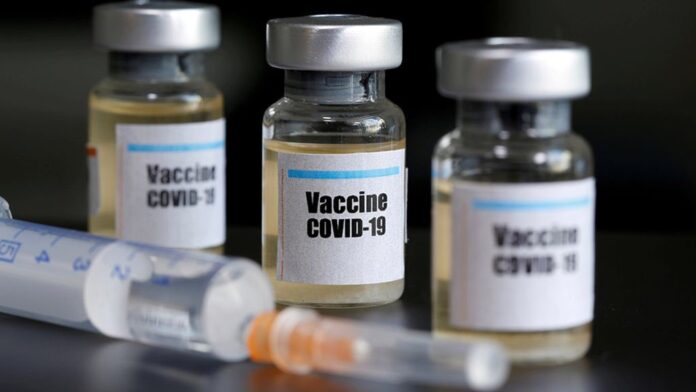Kenya is considering buying the Pfizer and Johnson and Johnson vaccines.
According to Health CS Mutahi Kagwe, the country is making the move in a bid to keep its Covid-19 vaccination program going after experiencing supply hitches with the Astra Zeneca vaccine.
Speaking at his Afya House office on April 21, 2021, Mr Kagwe said the government was pursuing acquisition of one million doses of vaccines each from Pfizer as well as Johnson and Johnson respectively to boost its vaccine stick that consists of Astrazeneca vaccines.
He made the remarks while answering questions from the media after receiving a donation of personal protective equipment (PPEs) worth Sh 2.3 million donated by Multi Choice Kenya .
Mr Kagwe said the country’s vaccine importation had been affected by a rise in the Covid-19 cases in India.
The CS noted that India the manufacturer of the Astrazeneca vaccines was going through a challenging time with over 200,000 cases on covid-19 being recorded daily.
“With up to 200,000 new cases being reported in India daily, the country now accounts for a third of new infections worldwide. It was for this reason India had slowed down the supply of Astrazeneca to address the problem in their country,” said Mr Kagwe.
The latest Indian seven day average for the week ending April 19, 2021 is 221,771 cases per day. The capital Delhi and six other account for two thirds of the new daily cases.
Hospitals in the affected regions are overwhelmed, with hospitals and crematoriums reporting record numbers.
Vaccinations in parts of India have also ground to a halt due to lack of supplies.
In the state of Odisha, Health Secretary P.K. Mohapatra confirmed that authorities have temporarily stopped the vaccination exercise in about 700 centres.
“We have a shortage of vaccines. What ever is available will last until tomorrow,” he told the press on April 9, 2021.
His comments were however disputed by the national government health minister Harsh Vardhan, who said the authorities had 40 million doses at hand for onward distribution to the states.
It is this surge coupled with the vaccine shortage that is blamed for the stoppage of vaccine exports to countries like Kenya that had ordered for the jab via the Covax facility.
“The surge has forced the Asian country to put a freeze on vaccine exports from the Serum Institute, which supplies Kenya with its Astra Zeneca vaccine stocks,” said Mr Kagwe.
On March 3, 2021, Kenya received its first batch of Astra Zeneca vaccines, which consisted of 1.02 million doses.
That batch is almost running out, with the next batch that was expected in April failing to arrive due to supply constraints attributed to the Serum Institute which is located in India.
The CS noted that under the Covax facility, Africa had expected to acquire 75 million doses but so far only 12 million doses had been delivered.
He however reiterated that the vaccines must meet the World Health Organization standards as well as the country’s stringent rules before being administered to Kenyans.
Mr Kagwe said the Pfizer vaccines, which requires minus 70 degrees in storage, would not pose any challenge since the government would also acquire the special storage facilities to handle them.
Kenya plans to vaccinate at least 30 percent of its population by ordering around 24 million doses. The vaccination campaign is expected to last until the end of 2022, having been scaled up from an initial end date of June 2023.
The country’s Covid-19 caseload now stands at 153,488 cases with 2,540 deaths so far recorded.
Kagwe said the Kenya has only three sources where it acquires the vaccines.
“Our sources of vaccines include the government to government donations like the recent batch of 100,000 doses acquired from the government of India,” he said..
“The second platform is the Covax facility where the government acquired 1.1 million doses and the last one is the African Union,” he added.
Under the African Union facility which Kenya is yet to utilize, the CS said the members states had negotiated rates with manufacturers to acquire the vaccines at discounted prices.
The CS said the government banned the private sector from importing vaccines “because of the confusion it was going to create” in the health sector.
He said the government was determined to eliminate the risk of some people taking advantage to sell the jabs to Kenyans despite the fact that they are given free of charge.
“The supply chain had complicated the acquisition of more vaccines to the country. However, the government is tirelessly working to ensure the stocks do not get exhausted,” he said.
On the possibility of the country getting its second batch of Astra Zeneca vaccines in May or June, Mr Kagwe said he would not be holding his breath as the Indian Covid-19 situation had not eased up.
Mr Kagwe also hinted at the possibility of Kenyans that have received the first Astra Zeneca dose getting a different vaccine for their second dose.
“It is unwise to mix vaccines. This is what we were initially told by experts but now we hear that the Chinese are beginning to mix vaccines,” said the CS.
He said the trend could soon be repeated in the country in case the vaccine shortage persists.
“Some countries are already planning to have people receive a different type from the one they received on their first dose,” he said.
The CS was however quick to reassure Kenyans that the decision to mix vaccines had not yet been made. He added that such a decision would only be subject to scientific evidence on its effectiveness and safety.
“We will wait until there is enough evidence from science on whether it is a good idea to have two types of the vaccine for the first and second doses,” said Mr Kagwe.
He also reminded Kenyans that not all the vaccines were similar, pointing out that the Johnson and Johnson vaccine was a one-dose jab as compared to the two dose jabs like Pfizer, Astra Zeneca and Moderna.
“Remember that the Johnson and Johnson vaccine only consists of one dose as compared to the Moderna, Astra Zeneca and Pfizer vaccines. We are still not in a rush to start mixing the vaccines among the population,” he said.
Mr Kagwe attributed the drop in the positivity rate being witnessed in the country in the last two weeks to increased adherence to the preventive measures among Kenyans.
He expressed hopes that the positivity rate would drop even more drastically to dip below the 5 percent required to unlock the country’s five disease zone counties for full-fledged economic activities.
Kagwe said the spikes were being witnessed in the Counties of Muranga, Uasin Gishu, Siaya and Nyeri were likely to complicate the fight against the pandemic.
He added that the ministry had already spoken to the affected counties’ governors to undertake county specific measures and slow down the spread of the viral disease.
The CS further acknowledged the painful economic impact of the restrictive measures but noted that there was no alternative way of reducing the spread.
“As painful as the restrictions measures are concerned, the containment measures must be adhered to. For the time being we have to strictly adhere to the containment measures, until such a time that we bring down the cases and our positivity rate,” he added.
Mr Kagwe termed that the country’s general ward and Intensive Care Units hospitalization rate “worrying and very high”.
“We do not want to have a situation where one cannot get treated in hospitals for other ailments,” he said.






































